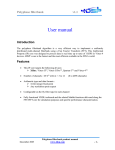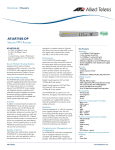Download Alcatel-Lucent 1677 User's Manual
Transcript
Alcatel-Lucent 1677 SONET Link NEXT-GENERATION MULTISERVICE PLATFORM Never before have businesses been under such pressure to provide and support multiple high-bandwidth services while continuing to support traditional revenue-generating services. The Alcatel-Lucent 1677 SONET Link provides the means to maximize bandwidth availability and to fill that bandwidth effectively. Meeting Expanding Demands Working with SONET Businesses have invested billions of dollars in their SONET network infrastructures, their operations systems, and the personnel to run and maintain them. Customers, both consumers and businesses, are now demanding more services, more versatility and more bandwidth, and these demands are expected to continue to rise over the next few years. Consequently, SONET equipment is still called on to provide transport for new and existing services. Pressure for revenue growth means that services must be deployed in the here and now, without dramatic changes to the network topology or to operational methods. To fully use and expand the capabilities of SONET, next-generation transport solutions must be able to aggregate disparate native channels at differing bit rates, groom these signals seamlessly, and then efficiently fill the transport “pipes”. The Alcatel-Lucent 1677 SONET Link (SL) fulfills these requirements by combining the functions of legacy SONET add/drop multiplexers (ADMs), the bandwidth-grooming capability of narrowband, wideband and broadband digital cross-connects, and the optical fiber-sharing of dense wavelength division multiplexing (DWDM). The Alcatel-Lucent 1677 SL offers best-in-class port densities combined with the scalability that is necessary for gradually adding more services. What’s more, this class-leading feature set comes at a realistic price. YOUR NEEDS Most operators have sufficient fiber in the ground to support current and near-future needs, provided that the fiber is used effectively. In situations in which more bandwidth is needed, they know that AlcatelLucent has a full range of state-of-the-art active and passive coarse wavelength division multiplexing (CWDM) and DWDM devices. What operators want is a network element (NE) that leverages the existing network, offers data and other services via this network, and grooms signals at the network edge. The NE must produce substantial cost savings over incumbent equipment by providing significantly increased switching capacity and port density, while at the same time controlling heat output and power usage. Alcatel-Lucent 1677 SONET Link A L C AT E L - L U C E N T > 1 YOUR BENEFIT The Alcatel-Lucent 1677 SL offers SONET add/drop multiplexing, narrowband, wideband and broadband cross-connect functionality, plus DWDM. It supports a broad range of service interfaces and service features, such as virtual concatenation (VCAT), Gigabit Ethernet broadcasting, section, line and path performance monitoring right down to the DS1/DS3 level, and DS0 grooming. The Alcatel-Lucent 1677 SL offers a class-leading 1536 x 1536 synchronous transport signal level 1 (STS-1) fabric as well as second-to-none port density and switch density. The universal I/O is not constrained by line or tributary restrictions, and fully redundant common control and switching modules ensure quality of service (QoS) at the five nines standard or better. Benefit Feature Function Pay-as-you-grow Class-leading scalability Support for interfaces from DS1 to OC-192, Fast Ethernet and Gigabit Ethernet, allowing a wide range of applications from a single platform. Reduced real estate Superior density 24 half-height universal interface cards; 2 chassis per 7-foot rack. Example: 840 DS1 per rack. Multi-ring architecture. Reduced OPEX Less space required, less power, less heat Multifunctionality of slots; modern component design. Quality of service 99.999% reliability Fully redundant common control and switching elements, NEBS Level 3-certified. Interoperability Industry-standard interface management Open architecture for integration in any OSS. Efficient transport Grooming Modular design, allowing for optimal grooming based on the application: STS, VT1.5, transmultiplexer and Gigabit Ethernet. Efficient management Available Alcatel-Lucent 1353 NM element manager for multiservice transport networks Ring management, configuration discovery, alarm and topological views provided by a user-friendly GUI. 2 < A L C AT E L - L U C E N T Scalability for Increasing Capacity Legacy equipment makes it difficult for businesses to scale their networks to meet ever-changing demands for increased capacity and new high-bandwidth services. Upgrading the capacity of a traditional SONET ring can be a time-consuming and expensive process, often requiring the replacement of thousands of dollars’ worth of equipment. Deploying new rings could be even more complex and difficult to manage, with even further investment in additional central office equipment to terminate the ring and to switch traffic throughout the network. As a next-generation SONET solution, the Alcatel-Lucent 1677 SL eliminates scaling-limitation issues and additional ring-upgrade complexity. The AlcatelLucent 1677 SL provides for future expansion as bandwidth needs grow within metropolitan and regional networks. When a new service offering is created, AlcatelLucent clients can increase support for hundreds of subtended rings from the same NE and from a variety of interfaces, to support the myriad offerings that they will want to provide. The ability to grow networks with an installed base of equipment provides businesses with rapid returns on their investments and saves operational and engineering expenses. Key functionality, such as OC-192, VT1.5 grooming and transmultiplexer support, allows AlcatelLucent clients to get ahead of their competition when rolling out nextgeneration services. On-board, point-topoint DS0 grooming eliminates the need for a second NE or for inter-machine trunks. No competitor’s solution beats the Alcatel-Lucent 1677 SL for integrated functionality. BANDWIDTH MANAGEMENT Successful businesses efficiently manage bandwidth and network resources. As large metropolitan and regional networks evolve to support hundreds of rings and terabytes of capacity in a region, it is imperative that they have the power and flexibility to switch and groom end-customer services in the most resource-efficient way possible. This means taking small, disparate feeds that are currently transported inefficiently and combining them into appropriately sized trunks to maximize return on investment. The Alcatel-Lucent 1677 SL grooms traffic by taking circuits from multiple interfaces and switching them onto one pipe for transport across the network. The Alcatel-Lucent 1677 SL supports STS-n (n = 1 to 48c) grooming to make the most efficient use of the carrier’s network infrastructure (see Figure 1). Additionally, two optional modules provide DS0 and VT1.5 switching capability, allowing fine-grain bandwidth management. Full-featured wideband and narrowband grooming are also possible with this modest-sized platform using the transmultiplexing card, and carriers may deploy this capability as needed. In contrast to the traditional centralized model, the multi-ring termination and bandwidth-grooming capabilities of the Alcatel-Lucent 1677 SL fit the emerging optical network model that disperses bandwidth management to the edge of the network. Figure 1 - Bandwidth Grooming STS-n Matrix VT 1.5 VT 1.5 VT 1.5 VT 1.5 VT 1.5 VT 1.5 VT 1.5 VT 1.5 VT 1.5 VT 1.5 VT 1.5 VT 1.5 VT 1.5 VT 1.5 VT 1.5 VT 1.5 VT 1.5 VT 1.5 VT 1.5 VT 1.5 VT 1.5 VT 1.5 VT 1.5 VT 1.5 VT 1.5 VT 1.5 VT 1.5 VT 1.5 VT 1.5 VT 1.5 VT 1.5 VT 1.5 VT 1.5 VT 1.5 VT 1.5 VT 1.5 VT 1.5 VT 1.5 VT 1.5 VT 1.5 VT 1.5 VT 1.5 VT 1.5 VT 1.5 VT 1.5 VT 1.5 VT 1.5 VT 1.5 VT 1.5 VT 1.5 VT 1.5 VT 1.5 VT 1.5 VT 1.5 VT 1.5 VT 1.5 VT 1.5 VT 1.5 STS-1 VT 1.5 VT 1.5 A L C AT E L - L U C E N T > 3 INTEROPERABILITY MULTIFUNCTIONALITY As businesses roll out new network equipment, this equipment must be integrated into their back-office environments and under their operations support systems (OSSs), which provide provisioning, monitoring and management of multiple vendors’ NEs. Hence, the network management architecture must provide standard, user-friendly, open interfaces to allow other third-party vendors to pick up support for the product. This enables them to provide comprehensive management such as end-to-end provisioning and monitoring across multiple NEs. The Alcatel-Lucent 1677 SL is designed with the goal of deployment in a carrier-class environment and includes development for open interfaces for OSS integration. The AlcatelLucent 1677 SL supports interworking standards such as open systems interconnection (OSI) and target ID address resolution protocol (TARP), and these allow integration with other vendors’ systems. Any new capital expenditure must be justified by increased revenues and profitability, and the Alcatel-Lucent 1677 SL provides these benefits. For example, its multi-ring feature allows numerous users and circuits to be supported on one NE, thus eliminating the need for multiple NEs (see Figure 2). This decrease in equipment use results in an immediate reduction in CAPEX, followed by ongoing savings in OPEX. In addition to the valuable protection and restoration capabilities of SONET, the Alcatel-Lucent 1677 SL offers businesses the opportunity to deliver Gigabit Ethernet services. The Gigabit Ethernet interface of the Alcatel-Lucent 1677 SL makes use of leading-edge technology to permit the transport of data services over the existing SONET infrastructure. This capability enables new revenue sources in return for compellingly low deployment costs. Alcatel-Lucent was one of the first vendors to support VCAT, the standard that enables businesses to map Ethernet Figure 2 - Multi-Ring Capability OC-192 BLSR OC-192 UPSR OC-48 UPSR 4 < A L C AT E L - L U C E N T OC-12 UPSR OC-48 UPSR directly onto a SONET network (see Figure 3). VCAT enables these operators to offer low-cost Ethernet services, while maintaining all the benefits of SONET networking and without requiring drastic changes to the network infrastructure or operational systems. Figure 3 - Ethernet Signals are mapped into SONET and then virtually concatenated Ethernet Streams SONET STS-1s VC Group STS-1... Xv #1 #2 #3 #n GOING FROM STRENGTH TO STRENGTH Alcatel-Lucent continues to invest heavily in the development of the 1677 SL, winning industry interest and customer satisfaction. Recently added functionality includes Gigabit Ethernet broadcast, dual-ring interconnection, transmultiplexing without the need for a vertical switch controller (VSC), DS1 management integration, and DS0 grooming. More is on the way for this exceptionally flexible and upgradeable solution. T H E A L C AT E L - L U C E N T A D VA N TA G E Alcatel-Lucent is in the best position to help service providers achieve network optimization by converging disparate services into one network to offer triple play services. Alcatel-Lucent is the world leader in the design and supply of future-safe, next-generation digital cross-connects and multiservice platforms. Our transport solutions offer the versatility and scalability that have become the mainstays of successful service providers the world over. Moreover, Alcatel-Lucent is in the enviable position of offering customers the best expertise, service and support available. KEY ALCATEL-LUCENT 1677 SL FEATURES > Interfaces: DS1, DS3, OC-3, OC-12, OC-48, OC-192 > Ring APS: 1+1 uni/bidirectional, UPSR, BLSR 2F, unprotected > STS-n grooming (80 Gb/s) > VT1.5 grooming (10 Gb/s) > DS0 grooming (2.5 Gb/s) > Transmultiplexing (5 Gb/s) A L C AT E L - L U C E N T > 5 www.alcatel-lucent.com Alcatel, Lucent, Alcatel-Lucent and the Alcatel-Lucent logo are trademarks of Alcatel-Lucent. All other trademarks are the property of their respective owners. Alcatel-Lucent assumes no responsibility for the accuracy of the information presented, which is subject to change without notice. © 01 2007 Alcatel-Lucent. All rights reserved. 3CL 00469 0706 TQZZA Ed.03 21311



















